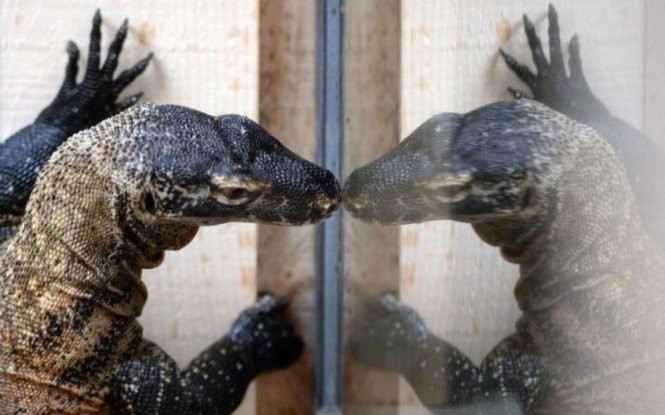The magic of Komodo dragon blood
A study from the United States said that special antibodies in Komodo dragons can help make effective antibiotics for humans.
Komodo dragon (Varanus komodoensis) is a large lizard species that lives mainly in Indonesia. It is a member of the Varanidae family, and is believed to have appeared on Earth about 5 million years ago. When mature, it reaches a maximum length of 3 meters and can weigh up to 90kg.
Komodo dragons are also known as Komod o daisies or Komodo island momentum in scientific texts. They originate from the Indonesian island of Komodo, where they are called ora, buaya darat (land crocodile), or biawak raksasa (giant varan).
This predatory reptile is terrifying because in their saliva there are a total of 57 types of bacteria that cause damage. According to Science Alert, that interesting thing makes scientists pay attention.

Komodo Dragon - (Photo: AFP).
They bite their prey and secrete deadly ingredients into their prey. But scientists also found that when they bite each other, no Komodo dragon will get sick!
Komodo dragons have a strong immune system. Their salivary glands both contain deadly bacteria and antibodies. They will lick to heal wounds quickly in the natural environment, according to research published.
A group of scientists at Goge Mason University in Virginia (USA) has studied this issue in depth and discovered "antimicrobial peptites".
"It's an immune system that helps the body survive two to three weeks before the body starts creating antibodies against external infections , " explained biochemist Monique Van Hoek. "Antibacterial peptite".
The team identified 48 such "antimicrobial peptites" and synthesized 8. They tested the antibodies of Komodo dragons on two "viruses" , including staphylocoque that is considered to be particularly resistant drug.
The seven peptides of Komodo dragons killed both of the above "viruses" and a peptide killed only one "virus".

Komodo dragons have a strong immune system.
Thanks to the above positive results, scientists hope to conduct new studies soon to be able to create an antibiotic that will kill the "viruses" that are becoming a concern for humans. now because of the resistance to existing antibiotics.
The scientists also focused on the process of creating these peptite types. They also sought to answer the question of whether these peptites are only found in Komodo dragons or in other animals and even in humans.
Antibiotic resistance has become one of the global health threats.
According to the World Health Organization (WHO), about 480,000 people with multi-drug resistance each year and antibiotics begin to become complex issues for the treatment of HIV and malaria.
- Video: Komodo dragon re-feeds the raw chicken
- Komodo blood dragon will be made into new antibiotics
- Mysterious drama of Komodo dragon
- Komodo dragons attack people again
- Video: 7 Komodo dragons rarely born in Indonesia
- Komodo dragons originate from Australia
- Video: Dragon komodo drama battle on Indonesian island
- Dragon Island in Indonesia
- Tiger snakes fight Komodo dragons
- Amazing world of Komodo dragons
- Singapore successfully propagated Komodo dragon
- Why are Komodo dragons more 'short-lived' than males?
 Animal 'suffering' after hibernation
Animal 'suffering' after hibernation Why do goats climb well?
Why do goats climb well? Scientists were surprised to see chimpanzees eating turtles
Scientists were surprised to see chimpanzees eating turtles Giant catfish died deadly due to drought in Thailand
Giant catfish died deadly due to drought in Thailand